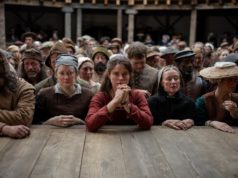They looked ready to sweep everything before them in the new century. Cate Blanchett has certainly held up her end nine years on, but Shekhar Kapur has been a different proposition. Having directed only one film in the intervening nine years (a gormless remake of The Four Feathers), he now re-teams with Blanchett for Elizabeth: The Golden Age, a sequel to the movie that made their reputations. Unfortunately, it gives the ominous impression that its director, who says he always imagined a trio of films about Queen Elizabeth I, has run out of things to say about his subject.
The new installment picks up in the mid-1680s, with the queen’s reign reaching a full-blown crisis. Catholic Spain is preparing a massive invasion to remove the infidel monarch from power in favor of the imprisoned Mary, Queen of Scots (Samantha Morton, not given enough to do here), and Elizabeth’s trusted longtime advisors like Francis Walsingham (Geoffrey Rush) are rapidly showing their age in the face of the adversity. Amid the rising tumult, she takes solace in the company of Walter Raleigh (Clive Owen), the explorer recently returned from America, a swashbuckling presence who breathes new life into the court.
Owen’s entry into this series strikes all manner of sparks, especially when he’s first placed in front of Blanchett. As the queen, she looks tickled in a fresh, open way by the brash adventurer and as mesmerized as we are by his speech describing the experience of discovering the new world. Owen’s work in Closer, Sin City, and Children of Men wouldn’t give you the impression of a lyrical actor, but here he shows his character’s eye for beauty as well as his way with words. (The historical Raleigh had the latter at least — he was a published poet in addition to being an explorer.)
The chemistry between Owen and Blanchett spices up the first hour or so, but then the movie melts into second-rate soap opera when the queen helplessly watches Raleigh take up with her favorite handmaiden, also named Elizabeth (Abbie Cornish). Similarly watery is the subplot about the monarch’s agonized decision to execute Mary, Queen of Scots. The movie climaxes with the defeat of the Spanish Armada, but the most we see of that is one lousy boat being set on fire. I found myself wishing that the sequence had had more of the CGI effects that the Pirates of the Caribbean movies used so promiscuously.
More than this, the nasty political realism that so strongly characterized Elizabeth is gone. The specter of religious violence, which haunts all of Kapur’s Western movies, rears its head here, but this time it carries little menace. The concluding image of the queen acting as symbolic mother to the nation is far weaker than the one that concluded the first film, one of the monarch frozen into a soulless icon. Where its predecessor gave a ruthless clinic in Machiavellian royalpolitik, Elizabeth: The Golden Age has little more than fuzzy sentiment and mediocre spectacle to offer us.
Elizabeth: The Golden Age
Starring Cate Blanchett and Clive Owen. Directed by Shekhar Kapur. Written by Michael Hirst and William Nicholson. Rated PG-13.











